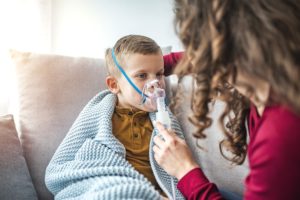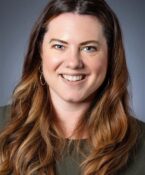SaferCare Texas, Asthma 411 and other leaders propose legislation benefiting Texas students

 The Asthma 411 team, as a part of The University of North Texas Health Science Center at Fort Worth’s patient safety organization SaferCare Texas, is leading the development of legislation to be presented in January during the 88th session of the Texas Legislature.
The Asthma 411 team, as a part of The University of North Texas Health Science Center at Fort Worth’s patient safety organization SaferCare Texas, is leading the development of legislation to be presented in January during the 88th session of the Texas Legislature.
The team has partnered to create the Texas Taskforce on Unassigned Albuterol Policy & Implementation, which has drafted a proposed amendment to House Bill 2243 to increase access to respiratory care for Texas students. Unassigned prescriptions, such as EpiPens, refer to medicine that a doctor authorizes to use in case of an emergency.
Members of the Asthma 411 Consortium — composed of SaferCare Texas, John Peter Smith Hospital/Acclaim and Cook Children’s Hospital — initially were surprised by the passing of HB 2243 in 2019. The bill was intended to support access to albuterol at school but unintentionally created barriers to this safe and potentially lifesaving medication.
Leslie Allsopp, clinical executive for SaferCare Texas, leads Asthma 411 programs and created the taskforce along with Dr. Folashade Afolabi, a pediatric pulmonologist.
“There was no national recommendation at that time,” Allsopp said. “We had not gotten to a point where we were engaged in a state-level conversation. So the legislation was well-meaning, but when we got word that HB 2243 had been passed, it was a shock to us.”
For years, schools partnered with the Asthma 411 Consortium would stock unassigned albuterol in the school nurse’s office for use on campus or at school-sanctioned events. Trained health staff could administer the drug to any child reasonably believed to be in respiratory distress even if a nurse was not available.
With the passing of HB 2243, Texas students can only receive unassigned albuterol from the school nurse on school grounds if their families have provided written documentation of an asthma diagnosis.
Teresa Wagner, interim director and clinical executive for health literacy for SaferCare, has assisted with drafting Asthma 411 materials to be more easily understood by parents and students. As a health literacy specialist, she said that miscommunication between the government, education and health care apparent in HB 2243 is not surprising.
“Honestly, the disconnect all goes back to health literacy,” Wagner said. “If government policymakers, legislators and educators don’t understand health information or health care issues, it’s difficult for them to make decisions that reflect the needs of communities or individuals.”
Additionally, students who do have a documented asthma diagnosis may leave campus for sporting events, field trips and other school activities, putting them out of bounds for the administration of unassigned albuterol.
Whether on campus or not, no one can help the student with quick relief medications, and the only alternative is calling an ambulance even if the nurse has a standing delegation order from a pediatrician and albuterol sitting in the nurse’s office. Waiting for the ambulance to arrive not only delays treatment but also places a large financial burden on parents.
“It’s just a heartbreaking thing,” Allsopp said. “If a child comes into a school nurse’s office who doesn’t have documentation of an asthma diagnosis — let’s say a 12-year-old, who is brought in wheezing and can say in between their wheezes, ‘Yes, I have asthma’ — the nurse can’t help that child if he or she doesn’t have that record or can’t contact the parent right away. They can only call EMS.”
This presents great barriers for the estimated 10,700 students in the Asthma 411 service area with asthma and no documentation of their diagnosis at school. HB 2243 was a catalyst for the Asthma 411 Consortium to change the bill.
“This is where academia plays a role in researching the facts and educating these critical decision-makers on the needs and gaps identified and solutions that will be both effective and equitable,” Wagner said. “Keeping an open line of communication is key but we also need academics to step forward and be willing to advocate.”
After learning of HB 2243, Allsopp and other leaders initiated conversations with leadership at HSC, the Texas Pediatric Society and the Asthma 411 Medical Advisory Council, including Dr. Priya Bui, an HSC Health pediatrician. These organizations were interested in supporting change to legislation and began to plan a course of action.
“This a great example of how we need to think outside of the box to really meet the needs of people in our community, especially children,” Bui said. “For asthma, making sure children have access to quick and easy medicine at school rather than having to seek medical attention and delay being treated is fantastic and makes a world of a difference for parents, patients and teachers. We are looking forward to having a change in the system, making it easier for children to manage a chronic condition like asthma while staying in school and enjoying activities.”
With a one-page outline that would become the proposed amendment HB 3819, the taskforce approached State Rep. Stephanie Klick for support in the 2021 87th legislative session. Klick has more than 35 years of nursing experience and quickly became an advocate for the proposed changes.
Proposed HB 3819 passed in the House and unanimously passed the Senate Public Education Subcommittee. However, the proposal never got a full Senate vote because of issues like the monumental freeze that hit Texas in spring 2021 and the COVID-19 pandemic, which slowed the session.
Later in the year, leading professional associations published national recommendations for unassigned albuterol legislation. In 2022, Texas HB 2243 remains markedly out of alignment.
The taskforce has again submitted a one-pager with draft legislative language. With the UNT System Office of General Counsel, the team will reach out to Klick again to support the bill and pre-file it so the amendment can be presented again in January.
“We feel confident that based on our history and evidence, this is going to improve the safety and well-being of children in Texas,” Allsopp said.





Social media